

WANDERVOGEL (2010) Les sentiers de l'utopie. Églises évangéliques et révolutions anglaises du 17e siècle. Rodrigue Allard Ce texte a pour objet les origines ecclésiastiques du Modèle politique anglais du 17e siècle, c'est à dire, la République et la Monarchie parlementaire.
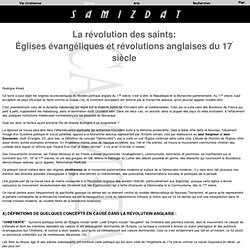
Au 17e siècle, sauf exception de pays d'Europe du Nord comme la Suède (1a), le Continent (européen) est dominé par la monarchie absolue, qu'on pourrait appeler modèle latin. Max Nettlau, Quelques idées fausses sur l'Anarchisme (1905) L'anarchisme peut être divisé en trois catégories: l'école révolutionnaire de Bakounine et Kropotkine, connue sous la dénomination d'anarchisme communiste; l’anarchisme éthique ou philosophique de Godwin, Proudhon et Tucker; et, enfin, l'anarchisme religieux de Tolstoï. Aussi, lorsqu'on parle des idées fausses que d'aucuns se font de l'anarchisme, il ne faut pas oublier que non seulement chacune des tendances est mal interprétée, mais encore que la confusion résulte de l'existence même desdites tendances, nécessairement antagoniques dans quelques extrêmes.
De la même façon ceux qui émettent ou se forment des idées fausses sur l'anarchisme constituent des catégories bien distinctes. Ces idées fausses sont nombreuses et variées, mais ce n'est pas ici le cas de les examiner toutes. Hippie Roots & The Perennial Subculture - Hippyland. Archives: Hippie Roots & The Perennial Subculture (Views: 417,793) Contributed by Skip on May 13th, 2003 By Gordon Kennedy & Kody Ryan According to Webster’s dictionary (2003) a "hippie" or "hippy" is: "a young person of the 1960’s who rejected established social mores, advocated spontaneity, free expression of love and the expansion of consciousness, often wore long hair and unconventional clothes, and used psychedelic drugs".
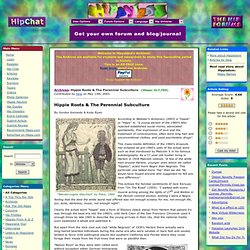
This mass-media definition of the 1960’s dropouts has eclipsed all pre-1960’s uses of the actual word such as that mentioned by Malcolm X in his famous autobiography. Theodore Roszak (1933-2011) : Thomas Gladysz : City Brights. Theodore Roszak, a Berkeley writer who coined the term “counter culture,” has died.
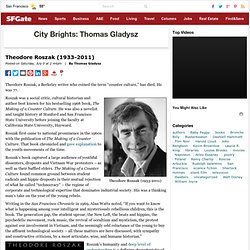
He was 77. Theodore Roszak (1933-2011) Roszak was a social critic, cultural historian and author best known for his bestselling 1968 book, The Making of a Counter Culture. He was also a novelist and taught history at Stanford and San Francisco State University before joining the faculty at California State University, Hayward. Raging Against the Machine. Who played in the Super Bowl in 1984?
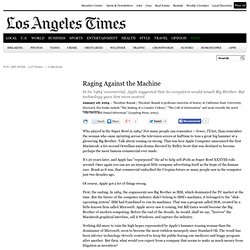
Not many people can remember -- fewer, I'll bet, than remember the woman who came sprinting across the television screen at halftime to toss a great big hammer at a glowering Big Brother. Talk about coming on strong. That was how Apple Computer announced the first Macintosh: a 60-second Orwellian mini-drama directed by Ridley Scott that was destined to become perhaps the most famous commercial ever made.
Computing and the Counterculture. Think Different(ly) The Macintosh has from its introduction been viewed-- and among some of its users, cherished-- as a computer that brings (as the 1960s slogan put it) "power to the people.
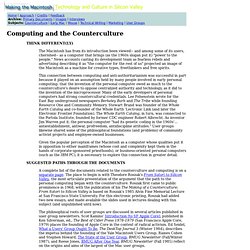
" News accounts casting its development team as fearless rebels and advertising describing it as "the computer for the rest of us" projected an image of the Macintosh as a machine for creative types, freethinkers and free spirits. This connection between computing and anti-authoritarianism was successful in part because it played on an assumption held by many people involved in early personal computing: that the invention of the personal computer owed as much to the counterculture's desire to oppose centralized authority and technology, as it did to the invention of the microprocessor. Many of the early developers of personal computers had strong countercultural credentials. Suggested Paths Through the Documents. Carl Gustav Jung FR partie 1 - une vidéo Cinéma. Carl Gustav Jung. Carl-Jung. Fils de pasteur, né en Suisse le 26 juillet 1875.
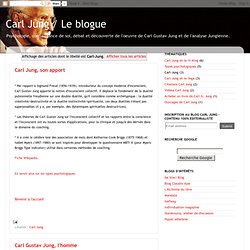
Il mourrut - également en Suisse, le 6 juin 1961 a l'âge de 85 ans. Études : Il effectua ses études de médecine puis se spécialisera en psychologie. Il soutiendra un doctorat sur « La psychopathologie des phénomènes dits occultes ». C'est a cette époque Jung rencontre Sabina Spielren, venue en Suisse pour une grace hystérie. Il devient son psychiatre, analyste et amant. Mystique et Monte Verità. Gustav Landauer. EDITIONS LA DIGITALE. La page de Gusto Gräser. MONTE Verità SOCIETE LIBRE ET NUE. LE MONTE Verità 1900-1930 : UNE SOCIETE LIBRE ET NUE MONTE Verità Dossier réalisé par le Blogmaster Ce qui devait être au départ un petit article sur le Monte Verità et la vie naturiste qui y était préconisée, s’est rapidement transformé, avouons-le, en une passionnante recherche.
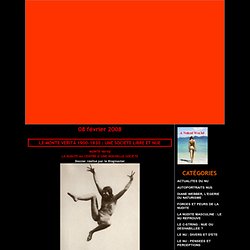
D’un groupe d’illuminés courant nus dans les champs (vision première), nous nous sommes retrouvés à explorer les courants de pensées en vogue dans l’Europe des années 1910-1930, dans le sillage de personnages complexes, tourmentés ou précurseurs et qui allaient marquer durablement leur temps. Ranter. The Ranters were a sect in the time of the English Commonwealth (1649–1660) who were regarded as heretical by the established Church of that period.
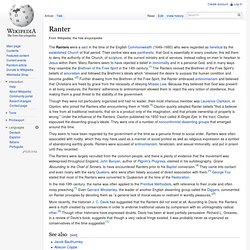
Their central idea was pantheistic, that God is essentially in every creature; this led them to deny the authority of the Church, of scripture, of the current ministry and of services, instead calling on men to hearken to Jesus within them. Many Ranters seem to have rejected a belief in immortality and in a personal God, and in many ways they resemble the Brethren of the Free Spirit in the 14th century.[1] The Ranters revived the Brethren of the Free Spirit's beliefs of amoralism and followed the Brethren's ideals which “stressed the desire to surpass the human condition and become godlike.”[2] Further drawing from the Brethren of the Free Spirit, the Ranter embraced antinomianism and believed that Christians are freed by grace from the necessity of obeying Mosaic Law.
More recently, the historian J. C. The Diggers (True Levellers) T he Diggers called themselves "True Levellers".
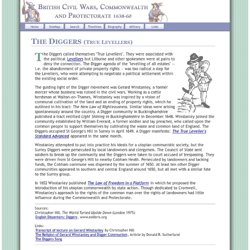
They were associated with the political Levellers but Lilburne and other spokesmen were at pains to deny the connection. The Digger agenda of the "levelling of all estates" — i.e. the abandonment of private property rights — was too radical a step for the Levellers, who were attempting to negotiate a political settlement within the existing social order. Subculture. Dick Hebdige Le sens du style Traduit de l’anglais (États-Unis) par Marc Saint-Upéry Ouvrage publié avec le concours du Centre national du Livre Pourtant, j’ai pu avoir une vingtaine de photographies et je les ai collées avec de la mie de pain mâchée au dos du règlement cartonné qui pend au mur.